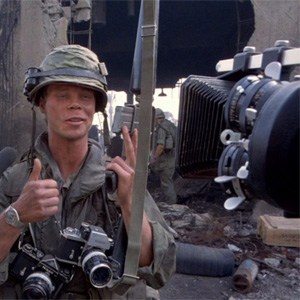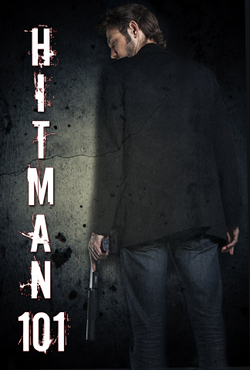Review: Full Metal Jacket (1987)
Cast: Matthew Modine, Adam Baldwin, Vincent D’Onofrio, R. Lee Ermey
Director: Stanley Kubrick
Country: UK | USA
Genre: Drama, War
Official Trailer: Here
Editor’s Note: This review of Full Metal Jacket is a part of Matthew Blevins’s Stanley Kubrick Spotlight.
Stanley Kubrick attempts to indoctrinate the soul of Pvt. J.T. ‘Joker’ Davis (Matthew Modine) in Full Metal Jacket. The indoctrination process begins with the removal of hair, a symbolic gesture that removes the identity of the recruit going in to basic training. There is no room for individuality in the early stages of training, and recruits must earn the right to have an identity in the meritorious military. His foil in this process is R. Lee Ermy’s iconic portrayal of Gunnery Sergeant Hartman, a role filled with one-liners that have shaped public perception of the basic training process for decades. Hartman’s job is to use the most effective means at his disposal to prepare these men for war, and this can prove to be a monumental task when forced to suffer fools like Vincent D’Onofrio’s Pvt. Leonard ‘Gomer Pyle’ Lawrence.
The indoctrination process begins with the removal of hair, a symbolic gesture that removes the identity of the recruit going in to basic training. There is no room for individuality in the early stages of training, and recruits must earn the right to have an identity in the meritorious military.
 Kubrick uses low angle tracking shots through the drab reflective surfaces of the barracks, sometimes making the 6’ tall Ermy appear small against the lines of young recruits, but his power comes from the humor that he has honed while training countless recruits throughout the years. Each verbal command is carefully crafted to illustrate the folly of one’s actions to the entire group in a memorable and often hilarious way. These men will remember Hartman’s words.
Kubrick uses low angle tracking shots through the drab reflective surfaces of the barracks, sometimes making the 6’ tall Ermy appear small against the lines of young recruits, but his power comes from the humor that he has honed while training countless recruits throughout the years. Each verbal command is carefully crafted to illustrate the folly of one’s actions to the entire group in a memorable and often hilarious way. These men will remember Hartman’s words.
Kubrick’s unnatural lighting sneaks through the windows, suggesting the unnatural conditions of the basic training environment. These men are on a literal and figurative island, and for them there is no reality outside of the dismal barrack walls and muddied obstacle courses of Parris Island. They will be pushed to their physical and mental limits and will be expected to deliver nothing less than perfection. They must endure this and grow from the experience so they will be prepared for the unforgiving conditions on the battlefield, where a man is expected to overcome his primal survival instincts for the good of the group. Failure to pay proper attention to detail can lead to fatalities, and as Hartman has famously exclaimed “Marines are not allowed to die without permission!”
Kubrick uses low angle tracking shots through the drab reflective surfaces of the barracks, sometimes making the 6’ tall Ermy appear small against the lines of young recruits, but his power comes from the humor that he has honed while training countless recruits throughout the years.
 Hartman’s training methods may seem cruel and unorthodox, but they were tried and true methods that served a purpose in their time. Drill instructors do not have the time to divert their attention from the group at large, and there are unspoken rules and methods for dealing with misfits and problem recruits. Private Pyle is the misfit in this particular group of recruits, and his slow mind and body present problems that will have to be reconciled with the brutality of a “blanket party”. Joker’s humanity is tested during this brutal hazing, and despite his participation in this hazing, he retains his humanity in the simple action of covering his ears to muffle Pyle’s pained cries.
Hartman’s training methods may seem cruel and unorthodox, but they were tried and true methods that served a purpose in their time. Drill instructors do not have the time to divert their attention from the group at large, and there are unspoken rules and methods for dealing with misfits and problem recruits. Private Pyle is the misfit in this particular group of recruits, and his slow mind and body present problems that will have to be reconciled with the brutality of a “blanket party”. Joker’s humanity is tested during this brutal hazing, and despite his participation in this hazing, he retains his humanity in the simple action of covering his ears to muffle Pyle’s pained cries.
This basic training sequence is the most easily accessible part of the film because of the humor and intriguing (if not dated) look in to a training process that not many will get to see. It is essential in establishing Joker’s arc, as Kubrick explores one man’s journey through what he perceives to be a dehumanizing process to see if a person’s humanity can truly be removed. Joker has no name until he is assigned one by his drill instructor. He is not allowed an identity until he has earned it, and proven that he has what it takes to thrive in the most unnatural environments that man has ever been placed in.
Despite the dramatic events that unfold, basic training is merely the adolescence that will provide Joker with the tools necessary to step in to the adulthood of the Vietnam War. The drab greys, greens, and browns of Parris Island have given way to the discordant colors of urban warfare. The humor has been toned down with the absence of Hartman, but the most important parts in Joker’s arc live in the tonally different second half of the film. Now the humor is hidden in subversive quips and the pedantic manipulation of the truth through the semantics and language of military existence. Bored Marines occupy every space in the disheveled barracks of war, like tightly coiled springs of potential energy, ready to explosively expand at a moment’s notice. This is America’s first “Primetime TV War”, and this new exposure provides new outlets for self-expression that reshape the look and emotional dynamic of a soldier.
This is America’s first “Primetime TV War”, and this new exposure provides new outlets for self-expression that reshape the look and emotional dynamic of a soldier.
 Joker is the personification of these new uncertain times. He is new America, fragmented at the core and occupying a space between compassion and viciousness. Kubrick ties the fate of our national identity to Joker’s humanity, and the duality expressed by the conflicting accoutrements on his helmet and jacket represent the duality of a nation approaching the death of the objective certainty of its own greatness. War would never again have its air of false romance when the whole world was allowed to look on. The myth of an old America with uniform ideals and certainty in her own righteousness was our basic training phase. Our current reality is more like Kubrick’s vision of the discordant nature of war. Full Metal Jacket is fragmented because humanity is fragmented. There is a battle of conflicting ideals within us all, because the reality of life is often in diametric opposition of our inner philosophies. That duality is the albatross of humanity that both defines us and tortures us. Our primal survival instincts and territorial nature have ultimately taken us to where we are. Unfortunately we have the self-awareness to assess our predicament; we just lack the knowledge to figure out a permanent solution.
Joker is the personification of these new uncertain times. He is new America, fragmented at the core and occupying a space between compassion and viciousness. Kubrick ties the fate of our national identity to Joker’s humanity, and the duality expressed by the conflicting accoutrements on his helmet and jacket represent the duality of a nation approaching the death of the objective certainty of its own greatness. War would never again have its air of false romance when the whole world was allowed to look on. The myth of an old America with uniform ideals and certainty in her own righteousness was our basic training phase. Our current reality is more like Kubrick’s vision of the discordant nature of war. Full Metal Jacket is fragmented because humanity is fragmented. There is a battle of conflicting ideals within us all, because the reality of life is often in diametric opposition of our inner philosophies. That duality is the albatross of humanity that both defines us and tortures us. Our primal survival instincts and territorial nature have ultimately taken us to where we are. Unfortunately we have the self-awareness to assess our predicament; we just lack the knowledge to figure out a permanent solution.
-
luke_a
-
http://twitter.com/NextProjection Christopher Misch
















 DVD Review: The Flaw (2011)
DVD Review: The Flaw (2011) Review: Lockout (2012)
Review: Lockout (2012) Review: Diamonds of the Night (1964)
Review: Diamonds of the Night (1964) Review: The Moth Diaries (2011)
Review: The Moth Diaries (2011) Subversive Saturday: Visual Training (1969)
Subversive Saturday: Visual Training (1969)

